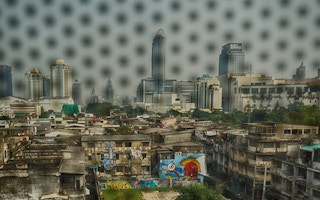Thailand’s government began deliberations last week on a new Clean Air Act to address the nation’s annual haze crisis that chokes the country during the dry season months, typically between December and April each year.
The sources of pollution are mainly human-made, from agricultural burning, both locally and in neighbouring countries, alongside sources from urban areas, traffic, and the industry, energy, mining and waste sectors. Air quality is also affected by forest fires that have taken a toll on the region’s landscapes and wildlife in recent years.
Of chief concern are levels of PM2.5, a class of airborne pollutants so fine that they can be inhaled into the lungs, which typically far exceed guideline levels set by the World Health Organization (WHO) in many parts of the country each year.
Following Thailand’s general election in May 2023, the new administration led by Prime Minister Srettha Thaivisin have vowed to tackle the air pollution crisis as a matter of urgency.
“This toxic PM2.5 haze is just a symptom of the problem, just like the tip of an iceberg. There are root causes that need to be seriously tackled in order to solve it,” Buntoon Srethasirote, chair of the Strategic Transformation Office’s Clean Air Act working group, told local media in November 2023.
Several separate versions of draft legislation have been submitted for parliamentary consideration. Among the versions are four compiled by political parties: one each from Srettha’s ruling Pheu Thai and its minor coalition partner, Bhumjai Thai; and one each from the opposition Democratic Party and Move Forward Party.
There’s also a citizen-backed version advocated by the Thailand Clean Air Network (Thailand CAN), a group of activists and academics who have campaigned for years for action to address the air pollution crisis.
While many parliamentary processes remain, such as formal debate on which clauses proposed in each separate draft version should make it into the final draft legislation, the government reportedly aims to pass the Clean Air Act into law by the end of 2024.
Thailand CAN’s proposal is based around rights-based principles that everyone has a right to breathe clean air, in line with the 2022 UN General Assembly declaration that Thailand voted in favor of. The group first submitted its draft to the Thai parliament two years ago, on Jan. 21, 2022, and is calling on citizens to demonstrate their support of its recommendations via a public petition.
So far, the petition has garnered the endorsement of more than 80,000 citizens, eight times what’s needed to get a civil-backed draft act to enter the legislative proceedings by the Thai parliament.
In a November 2023 letter calling policymakers to take serious steps to resolve the air pollution crisis, Thailand CAN pointed to a historical lack of coordination between government agencies as a reason why the government’s response to date has been inadequate.
“There are no management systems in place to address this issue in a fully integrated manner, and as such, state agencies are continuously stuck in a vicious cycle, fixated in addressing only the repercussions of the problem,” the letter said.
The Thailand CAN draft presents what the group describes in a recent report as “integrated and sustainable” ways of tackling the haze crisis, which sets it apart from all other versions competing for parliamentary approval.
“
This toxic PM2.5 haze is just a symptom of the problem, just like the tip of an iceberg. There are root causes that need to be seriously tackled in order to solve it.
Buntoon Srethasirote, chair, Strategic Transformation Office Clean Air Act working group
Like most other versions, the citizen-backed proposal advocates the establishment of an agency to monitor, coordinate and manage air pollution control efforts, and the creation of tax incentives for reducing emissions. It also mandates that polluters pay for damages and recommends a fund to support anti-pollution initiatives.
However, the Thailand CAN draft presents solutions that go beyond coping with the effects of the air pollution toward addressing the root causes, most of which are human-made and many transboundary in nature — a major complicating factor for addressing the issue outside of Thailand’s jurisdiction, with air pollution drifting into Thailand from burning fields or industry in neighbouring Cambodia, Laos and Myanmar. It also features plans for empowering locally-led solutions to ensure the impacts of regulations are fairly distributed.
Core collaborative solutions include policies and measures for industry, transportation, energy, mining and waste management, the urban environment, and the crucial agricultural sector, including management of forest fires and transboundary haze by enhancing subregional cooperation and using satellite technology and monitoring systems.
Meanwhile, as the legislative process gets slowly underway, Thailand is facing spiking air pollution levels that medical experts have long linked to heightened risk of developing lung cancer, heart disease and stroke, and that can shorten life spans by four or five years.
In early December 2023, Krittai Tanasombatkul, a clinical epidemiologist at Chiang Mai University’s medical school, succumbed to lung cancer at the age of 29. A campaigner for better air, Krittai had called on the government to take concerted action on pollution levels.
This story was published with permission from Mongabay.com.










